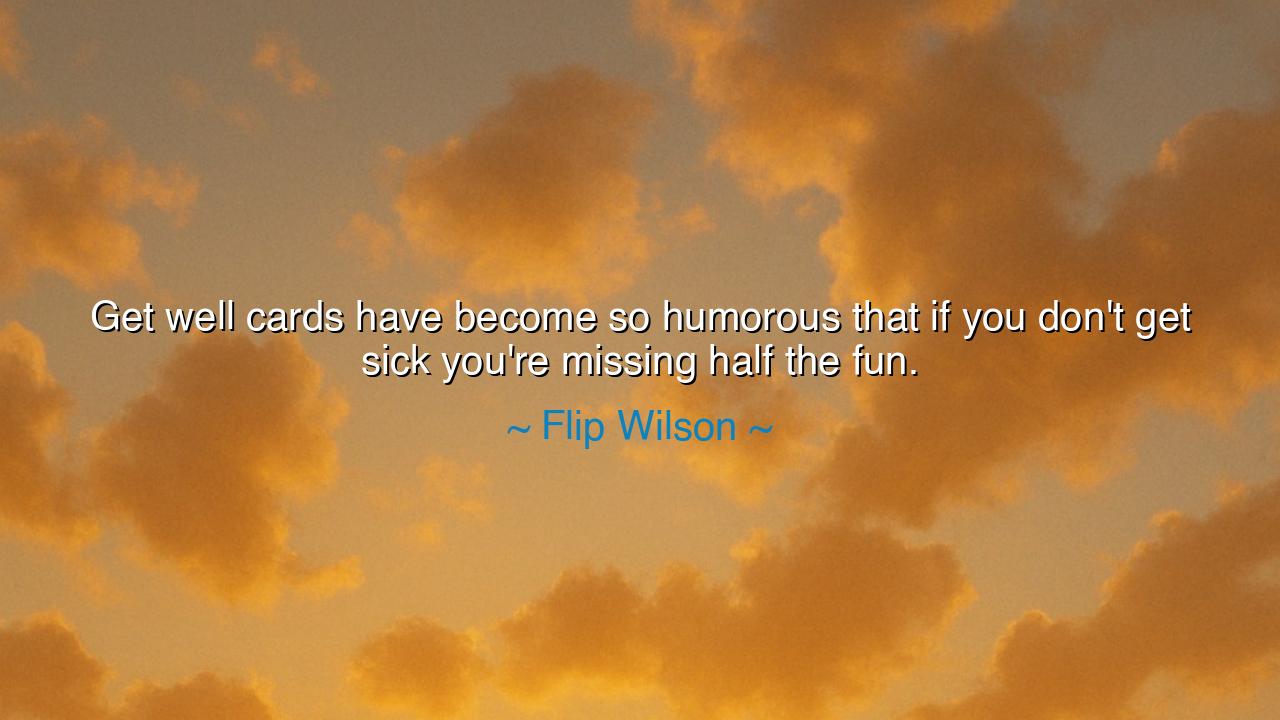
Get well cards have become so humorous that if you don't get sick
Get well cards have become so humorous that if you don't get sick you're missing half the fun.






In the bright laughter of a man who turned sorrow into song, Flip Wilson once said: “Get well cards have become so humorous that if you don’t get sick you’re missing half the fun.” Though clothed in jest, this saying hides a deep and shining truth about the power of humor to heal, to comfort, and to transform even pain into joy. Beneath the laughter lies a wisdom as old as humanity itself: that the spirit which can find light in darkness is the spirit that cannot be defeated. Wilson, a master of wit and warmth, understood that laughter is not the denial of suffering—it is its redemption.
In ages past, the wise have always known that joy and suffering are intertwined. The Greeks spoke of Euphrosyne, goddess of gladness, who often followed in the footsteps of Melancholy, for one could not exist without the other. So it is with Wilson’s remark: the jest that sickness has become a source of fun is a playful reminder that humor turns the sting of misfortune into medicine. The get-well card—so small, so simple—becomes a symbol of the human will to smile even when the body falters. For what are these cards but proof that laughter can be offered as a balm, and that even in weakness, companionship and mirth are the strongest cures?
In the days of the Black Death, when despair darkened every home, a few brave souls took to the streets with songs, laughter, and grotesque dances, mocking the terror that surrounded them. Historians called them the “laughing mourners,” those who faced death with jest, as if to say: “You may take our flesh, but not our spirit.” Like Wilson, they knew that humor does not erase pain—it lifts it, allowing the heart to breathe again. That same spirit lives in every kind message, every light-hearted jest scribbled inside a get well card. For in those moments, laughter becomes an act of rebellion against despair, a refusal to bow before the weight of suffering.
Flip Wilson, born into hardship and rising from poverty to joy, carried that truth in his soul. His humor was not cruel, nor cynical, but human—it sprang from the desire to make others feel lighter, even for a heartbeat. When he joked that illness itself had become “fun,” he was not mocking pain but celebrating the courage it takes to face it with laughter. He saw that humor could turn the dreary rituals of sickness—the worry, the medicine, the waiting—into a shared moment of connection. In that way, humor heals not the body, but the soul, giving strength where medicine cannot reach.
There is a divine irony in Wilson’s wisdom. For what he truly teaches is that even in times of weakness, life gives us opportunities to choose laughter over fear. The humorous get well card, filled with jokes and smiles, is a reminder that we are not alone—that there are hearts beside ours, refusing to let gloom prevail. It is in these light exchanges that the spirit is fortified. The laughter may be gentle or absurd, but it carries within it something sacred: the insistence that hope will not yield.
Let us then take heed of Wilson’s teaching. Do not wait for sickness to remember joy. Share humor freely while life is strong and days are bright. Offer kind words, write with playfulness, speak with warmth. When hardship comes—as it must—face it not with dread but with a knowing smile. For the soul that laughs amid its struggles is not mocking life, but honoring it. The one who can laugh at their own misfortune has found the freedom no illness can touch.
So, children of the living world, let humor be your healing wine, your “get well” before you are ever ill. Laugh often, love deeply, and let no shadow silence your joy. When the storms of life pass over you, may your heart echo with Wilson’s truth: that laughter itself is half the cure, and that even in sickness, the human spirit can make fun out of fear and light out of pain. For laughter is not only the sound of amusement—it is the anthem of survival, the song that reminds us we are still alive.






AAdministratorAdministrator
Welcome, honored guests. Please leave a comment, we will respond soon